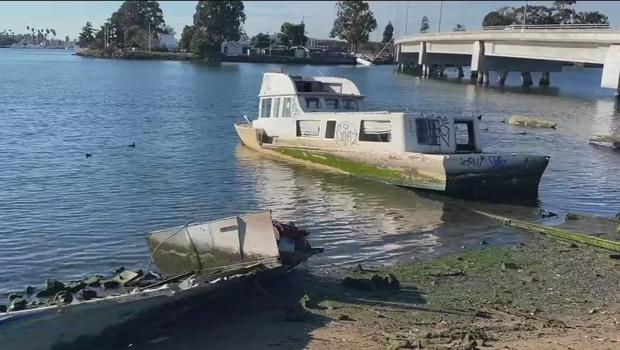When alleged “pirates” moved into the estuary and started rifling through boats kept in nearby marinas last summer, Oakland made headlines around the country and the world.
Although an attempt to drive them out appeared to be successful, the pirates have returned, and the city’s financial issues may ensure they will remain for a while.
The most recent homelessness issue in Oakland has nothing to do with tents or trailers. The acronym for these vessels is ADV, which stands for “abandoned and derelict vessels.” According to East Bay Rowing Club member Tom Horton, there are currently many of them on the Oakland side of the estuary.
“The Alameda Police Department is much more active about impounding and removing boats,” he stated. “But in Oakland, due to a variety of factors including lack of funding, you’ll find this whole community of anchor-out boats that are illegally moored along the shoreline.”
Homeless people started residing on boats a few years ago; these boats were frequently bought for as cheap as $1 from owners who were simply trying to get rid of them. Oakland enacted a law that forbids boats from being parked anywhere other than in a licensed marina spot for longer than 12 hours.
The issue is that the rule isn’t actually enforced by officials. According to reports, the Port of Oakland pays the wages of the lone officer assigned by the Oakland Police Department to patrol the whole estuary. Horton claims that the issue is now getting worse.
According to what I hear, they are unable to obtain fuel for their patrol boats since they have not been able to obtain approval for their diesel contract. it keeps them rooted,” Horton remarked.
Old vessels, many of them partially sunk, are now scattered throughout the estuary. Horton added, “Don’t expect any assistance from the Coast Guard, even though they look out at the problem every day.”
His words were, “No enforcement help,” “They will not cite the boats, they will not remove the boats, unless they are a hazard to navigation.”
Numerous crimes have been committed against all of the abandoned ships. Small boats are being stolen, and large vessels are being destroyed or ransacked. Most recently, two coaching boats were stolen from the Jack London Aquatic Center’s sailing facility.
Mary Spicer, who works with the nonprofit organization I Heart Oakland/Alameda Estuary, stated, “It’s gotten 100% worse because the enforcement has stopped,” “I believe it really does feel like fair play and permission to go out when there are a lot of ADVs on the water. However, it also conveys to the populace that the estuary is unsafe.
In order to pay for the removal and destruction of the ADVs, Spicer’s organization assisted in obtaining a $3 million government grant. According to reports, Oakland is one of just 13 communities to receive the National Oceanic and Atmospheric Administration’s vessel removal award. A grant of $150,000 is also given to them annually by the California Division of Boating and Waterways.
Authorities must also manage the crime that has been generated, even though that should assist Oakland in lowering the number of ADVs in the estuary. Additionally, with a $120 million deficit facing the city, it might be difficult to convince people to increase police patrols.
According to Spicer, it’s time for Oakland’s waterfront residents to trust the city’s officials again.
“The Oakland Estuary is fine when our cities are wealthy. Chaos breaks out and it’s like the Wild West on the ocean when we lose that financing,” she said. “In fact, we can completely contain it by deploying OPD to the water. And for that reason, it is crucial that we continue.”
In terms of criminality, sending the correct message can have a significant impact. People who work and live close to the water are concerned that they might be left to walk the plank alone if the city doesn’t give the estuary priority.
Note: Every piece of content is rigorously reviewed by our team of experienced writers and editors to ensure its accuracy. Our writers use credible sources and adhere to strict fact-checking protocols to verify all claims and data before publication. If an error is identified, we promptly correct it and strive for transparency in all updates, feel free to reach out to us via email. We appreciate your trust and support!
ChiefsFocus is a dedicated news writer with extensive experience in covering news across the United States. With a passion for storytelling and a commitment to journalistic integrity, ChiefsFocus delivers accurate and engaging content that informs and resonates with readers, keeping them updated on the latest developments nationwide.

